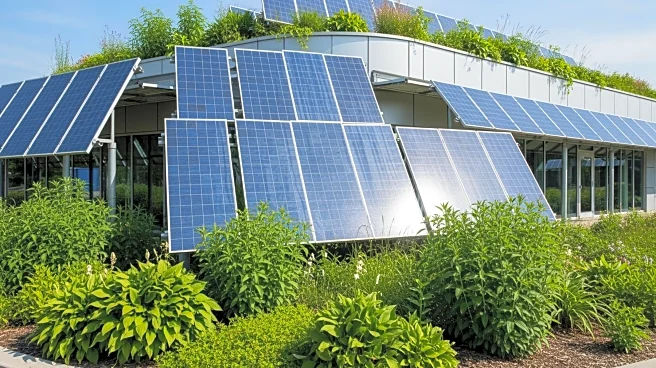What's Happening?
The concept of net zero energy buildings is gaining traction as a sustainable solution to energy consumption challenges. These buildings are designed to produce as much energy as they consume, often through renewable sources like solar power. Recent examples
include Swiss houses that generate significantly more energy than they use, with one producing 687% and another 817% of their energy needs. Additionally, initiatives such as the use of recycled electric car batteries in the Netherlands' stadiums and the installation of solar panels at Koch Industries' refineries in Minnesota and Texas demonstrate the growing adoption of renewable energy technologies. The integration of electric school buses and regenerative energy transit systems in cities like Barcelona further exemplifies the shift towards sustainable energy solutions.
Why It's Important?
The push towards net zero energy buildings and renewable energy technologies is crucial in addressing climate change and reducing carbon footprints. These initiatives not only contribute to environmental sustainability but also offer economic benefits by reducing energy costs and creating new job opportunities in the renewable energy sector. The transition to sustainable energy systems can lead to energy independence and security, reducing reliance on fossil fuels. As more industries and governments adopt these technologies, there is potential for significant reductions in greenhouse gas emissions, aligning with global climate goals.
What's Next?
The continued development and implementation of net zero energy technologies are expected to expand, with more industries and governments investing in sustainable energy solutions. This could lead to increased research and innovation in renewable energy technologies, further driving down costs and improving efficiency. Stakeholders, including policymakers, businesses, and environmental groups, are likely to advocate for supportive policies and incentives to accelerate the transition to net zero energy systems. The success of these initiatives could serve as a model for other regions and industries, promoting widespread adoption of sustainable energy practices.
Beyond the Headlines
The shift towards net zero energy buildings and renewable energy technologies also raises important ethical and cultural considerations. As these technologies become more prevalent, there is a need to ensure equitable access and address potential disparities in energy availability. Additionally, the cultural shift towards sustainability may influence consumer behavior and societal values, promoting a more environmentally conscious lifestyle. The long-term success of these initiatives will depend on collaboration between governments, industries, and communities to create inclusive and sustainable energy solutions.
















